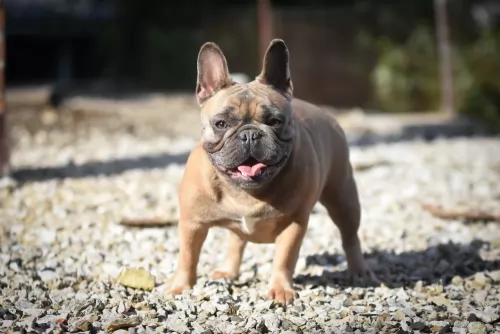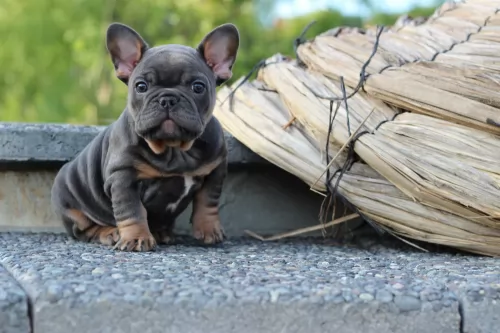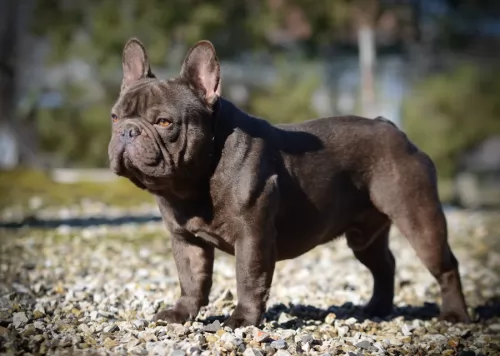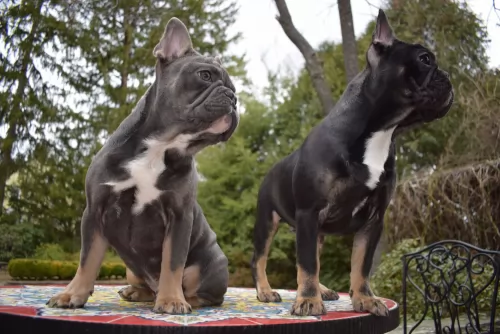 Petzlover
Petzlover French Bulldog is originated from France but Schipperke is originated from Belgium. Both French Bulldog and Schipperke are having almost same height. Both French Bulldog and Schipperke are having almost same weight. French Bulldog may live 3 years less than Schipperke. Both French Bulldog and Schipperke has almost same litter size. Both French Bulldog and Schipperke requires Low Maintenance.
French Bulldog is originated from France but Schipperke is originated from Belgium. Both French Bulldog and Schipperke are having almost same height. Both French Bulldog and Schipperke are having almost same weight. French Bulldog may live 3 years less than Schipperke. Both French Bulldog and Schipperke has almost same litter size. Both French Bulldog and Schipperke requires Low Maintenance.
 The french bulldog originated in England and are bred expecting small size bulldogs. Many lace workers in Nottingham had little bulldogs and when they emigrated to france, they brought their dogs with them. Soon they become popular in France and Europe. Then Americans showed interest in them.In 1896 frenchie was shown in United states in a show and after that they got their nickname "Frechie".
The french bulldog originated in England and are bred expecting small size bulldogs. Many lace workers in Nottingham had little bulldogs and when they emigrated to france, they brought their dogs with them. Soon they become popular in France and Europe. Then Americans showed interest in them.In 1896 frenchie was shown in United states in a show and after that they got their nickname "Frechie".
 The Schipperke is a small dog which hails from Belguim and where he is known as a Spitz.
The Schipperke is a small dog which hails from Belguim and where he is known as a Spitz.
There are however different theories regarding the Schipperke’s origin. It was however during the late 1800s, that Belgian Schipperke fanciers set a standard for the breed.
It was in 1888 that the first Schipperke was imported to the United States and a specialty club for the breed founded in 1905.
 Frenchie is a good companion dog and has a powerful muscular body. They like to play but also likes to relax for more time. They are intelligent and training them is very easy until they think it a game. They are free thinkers and are not very good in obedience. Frenchies should not be leaved alone for a long time.They love spending time with humans and generally they get along with everyone. They are excellent watchdogs and alerts when strangers come.
Frenchie is a good companion dog and has a powerful muscular body. They like to play but also likes to relax for more time. They are intelligent and training them is very easy until they think it a game. They are free thinkers and are not very good in obedience. Frenchies should not be leaved alone for a long time.They love spending time with humans and generally they get along with everyone. They are excellent watchdogs and alerts when strangers come.
French bulldog suits very well in apartments. But they should be made to walk for fifteen minutes daily to avoid over weight. They should not be kept outside on hot days. Frenchies will be very happy if you stay in home. They will follow you wherever you walk inside the house. They love people so much, such that people who own a Frenchie can not imagine life without them.
 This little Belgian dog stands at between 25 and 33cm in height and weighs between 3 and 9kg.
This little Belgian dog stands at between 25 and 33cm in height and weighs between 3 and 9kg.
The double coat of the dog is fairly short, but thick and it comes in a range of colors, but always solid, from chocolate to apricot to black.
A typical characteristic of his is the longer-haired ruff around his neck. He also has this longer hair around the hind legs. He has sharp, erect ears and the tail is a natural bobtail or long. Most people choose to have the tail docked.
These little dogs are no pushover. He is stubborn, strong-willed and confident. They are lively, intelligent, curious and energetic and will require plenty of exercise.
Small though he is, he will certainly need training and socialization, otherwise he just goes his own way. Training him will ensure he is obedient and not so strong-willed. They get on well with children, but they tend to be aggressive with other dogs that they haven’t grown up with.
Bring him up the right way and he makes a splendid pet.
 They are good children friendly dogs as they like to play with them. It will be good if they are supervised by an adult.
They are good children friendly dogs as they like to play with them. It will be good if they are supervised by an adult.
They are polite with everyone including other pets. They love to play games and chase balls but don't need much exercise.
Frenchies adapts well for apartment living but they don't like being alone for long time. They will not tolerate both hot and cold weather and so air conditioning will be better.
French Bulldogs are easy to train and are very much interested in playing.
 With his bright little face, the Schipperke dog is a surprising dog, being fearless, confident, protective and devoted – everything people looking for in an excellent pet want.
With his bright little face, the Schipperke dog is a surprising dog, being fearless, confident, protective and devoted – everything people looking for in an excellent pet want.
His small size makes him able to slot into life in the city or the countryside. He is also looked upon as low maintenance. Add to this the fact that he is intelligent too. He is a feisty dog, and that’s why we say he is surprising because while he can be your sweet companion dog, he can turn into a robust, feisty, daring little panther. He’s got everything going for him to make you a splendid pet.
 Frenchies can suffer from Von Willebrand's disease(VWD)and thyroid condition. Due to their flat faces they suffer from elongated soft palate or cleft palate. Because of their compacted air way they have inability to effectively regulate temperature.
Frenchies can suffer from Von Willebrand's disease(VWD)and thyroid condition. Due to their flat faces they suffer from elongated soft palate or cleft palate. Because of their compacted air way they have inability to effectively regulate temperature.
Any indication that the hair is unhealthy, such as brittleness and hair loss, should be addressed immediately to avoid any further damage. Hair loss becomes a problem when it becomes excessive, possibly due to disease or a particular condition.
 The Schipperke has no real health problems that he specifically gets, and he can live to be 13 years or older.
The Schipperke has no real health problems that he specifically gets, and he can live to be 13 years or older.
Over-feeding, bad food choices and lack of exercise are going to shorten the lifespan of this dog. Some dog illnesses to be aware of with the Schipperke is cancer, bloat, epilepsy, dental problems and luxating patella.
This is a condition where the knee cap of the dog moves out of its natural position. The patella moving out of the normal groove of the thigh bone can be because of genetic or traumatic reasons.
The symptoms of luxating patella include limping, skipping along as well as an abnormal sitting posture. Arthritis can also set in. Strangely, many small dogs live all their lives with luxating patella and they live like that free of pain. However for many other dogs it can mean pain and it can require surgery.
 As with all dogs, proper nutrition makes your French Bulldog a happy, healthy pup. He should have his own food and water bowls. Don't feed your French bulldog puppy, uncooked meat or food that may have gone bad. Young puppies need relatively large amount of food in order to meat the demands of their rapidly growing bodies and their hectic lifestyle. Feed your puppy specially designed chewing treats from reputable pet stores.
As with all dogs, proper nutrition makes your French Bulldog a happy, healthy pup. He should have his own food and water bowls. Don't feed your French bulldog puppy, uncooked meat or food that may have gone bad. Young puppies need relatively large amount of food in order to meat the demands of their rapidly growing bodies and their hectic lifestyle. Feed your puppy specially designed chewing treats from reputable pet stores.
According to the French BullDog Club of America, there are no specific guidelines for feeding them. Options for feeding your French Bulldog are commercial dry food, canned food, raw food and homemade meals. Calories required for frenchie varies depending on size, age, activity level and metabolism.
Frenchies can be made to walk or run for a particular distances. Heavy exercises should not be given as they face respiratory problems. Avoid exercising them in hot weather as they have chances of getting heatstroke.
 Dry kibble is always a good choice for dogs as its helps to keep the dog’s teeth clean. You want to make sure you buy one of the best quality foods, full of minerals and vitamins as opposed to fillers, colorants and preservatives. The food you give your Schipperke can have a huge impact on his health.
Dry kibble is always a good choice for dogs as its helps to keep the dog’s teeth clean. You want to make sure you buy one of the best quality foods, full of minerals and vitamins as opposed to fillers, colorants and preservatives. The food you give your Schipperke can have a huge impact on his health.
Your puppy will require 4 meals a day but later this becomes 2 bowls of food. To add some variety to your pet’s diet, feed him some home made food occasionally which can be added to his dry kibble twice a week.
Boiled chicken, brown rice or pasta and spinach, sweet potatoes and carrots are a healthy choice for your Schipperke.
Try and include some raw meat into the diet as this can help in fighting off horrible skin diseases. Make sure he has constant access to fresh, cool water.
Ensure regular vet checks for your dog, particularly when he is showing signs of being sick.
Check your pet for ticks and fleas. Parasites can be very bad for your pet’s health. Your dog will need all his vaccines to stave off deadly canine illnesses.
Brush your Schipperke twice a week to make sure you get rid of loose hairs. A Schipperke doesn’t shed a lot.
Keep his nails trimmed. If you are unsure on how to do this, professional groomers can do this for you.
Ears and eyes should also be checked.
He’s an energetic little dog so make sure that he gets lot of excellent forms of exercise from walking to hikes to ball games, frisbee – you name it, you won’t tire him out easily.